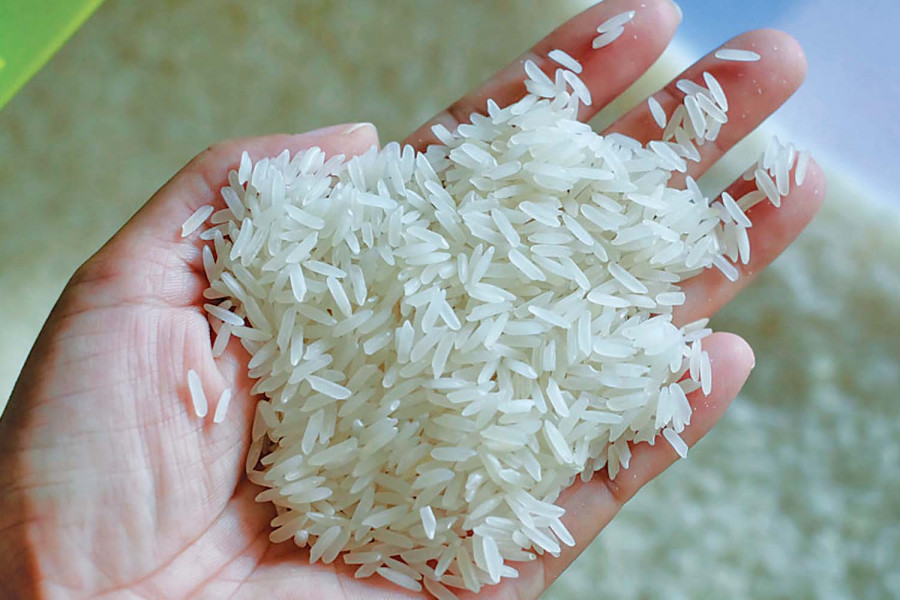
According to market observers, the price of the most common food grain in Nepali homes has gone up by Rs100 to Rs700 per bag.Nepal requires 4 million tonnes of rice annually to feed its population, and there could be a deficit of 480,000 tonnes this fiscal year. SHUTTERSTOCK
Food prices from wheat and meat to edible oils have shot up sharply and refuse to come down. And now even rice, the staple food of millions of Nepalis, has become more expensive.
According to market observers, the price of the most common grain food in Nepali homes has gone up by Rs100 to Rs700 per bag.
Analysts blame higher fertiliser costs for making food more expensive for inflation-hit consumers.
Prem Lal Maharjan, president of the National Consumer Forum, said that based on their market assessment, the price of rice has increased by Rs500 per 30-kg sack in the past five months.
Taichin rice now costs Rs4,400 per 25-kg sack, he said, up from Rs3,300.
The price of rice has been rising continuously in the past few months even though India has lifted export restrictions.
“Prices are increasing mainly due to a black market,” said Maharjan. “There is no specific reason why the price is rising in the domestic market.”
In a bid to control domestic prices, the Indian government banned exports of broken rice and slapped a 20 percent export tax on several varieties of rice starting September 9 last year.
The repercussion was felt in Nepal immediately with the price going up beyond control.
On November 2, India allowed the export of 600,000 tonnes of unmilled rice to Nepal, and lifted the 20 percent duty imposed on several varieties of rice.
Pavitra Bajracharya, immediate past president of the Nepal Retailers Association, says traders have increased prices on the pretext of a tax hike in India.
“But that’s not true. Nepal harvested its paddy crop in November, and the supply situation should have eased,” said Bajracharya. “The price should have dropped around this time, but we don’t know why it has been increasing.”
According to the association, the price of Trishuli Pokhreli rice increased to Rs90 per kg from Rs75 per kg two weeks ago. The price of steamed jeera masino rice has remained unchanged. The price of long-grain basmati rice has risen slightly to Rs130 per kg from Rs120 per kg.
The price of steamed sona mansuli rice increased to Rs60 per kg from Rs55 per kg.
Nepali farmers are expected to harvest 5.48 million tonnes of paddy this fiscal year, which is 7 percent more than last year, despite a crippling shortage of chemical fertiliser during the key transplantation period in the monsoon.
The paddy harvest will produce around 3.52 million tonnes of rice after milling.
Nepal requires 4 million tonnes of rice annually to feed its population, and there could be a deficit of 480,000 tonnes this fiscal year, according to the Ministry of Agriculture and Livestock Development.
The deficit is made up by imports from India.
According to the Department of Customs, Nepal’s rice imports declined by 46.49 percent to Rs10.66 billion in the first seven months of the current fiscal year ended mid-February.
Nepal imported 166,486 tonnes of rice in the first seven months compared to 382,294 tonnes in the same period of the last fiscal year.
The country imported 578,767 tonnes of rice worth Rs30.58 billion in the last fiscal year 2021-22.
“The government’s performance in market monitoring is weak, and opportunist traders are taking advantage of it,” said Maharjan. “Black marketing has been on the rise after the general election last November,” he said.
According to Nepal Rastra Bank, inflation in cereal grains and their products increased by 12.39 percent in mid-February compared to the same period of the last fiscal year.
Panu Poudel, chief operating officer of Bhat-Bhateni Supermarket and Departmental Store, said the price of premium rice increased by 15-20 percent per sack six months ago. Poudel said that the price of common rice too increased by 10-15 percent per sack.
“The price has not fluctuated much in recent days,” he said.
Experts say a large segment of the population depends on rice. Many of those who are food insecure will be badly affected if prices continue to rise and stay at these very high levels, they added.












